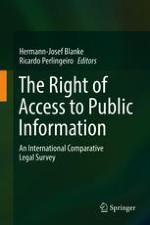2018 | OriginalPaper | Buchkapitel
5. The Swedish Legal Framework on the Right of Access to Official Documents
verfasst von : Patricia Jonason
Erschienen in: The Right of Access to Public Information
Verlag: Springer Berlin Heidelberg
Aktivieren Sie unsere intelligente Suche, um passende Fachinhalte oder Patente zu finden.
Wählen Sie Textabschnitte aus um mit Künstlicher Intelligenz passenden Patente zu finden. powered by
Markieren Sie Textabschnitte, um KI-gestützt weitere passende Inhalte zu finden. powered by
